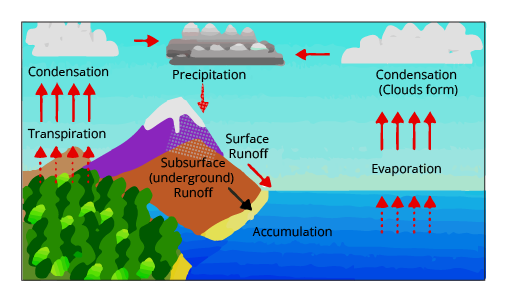An Overview of Important Questions Class 6 Science Chapter 14
FAQs on Important Questions For Class 6 Science Chapter 14 Water - 2025-26
1. What are some important 1-mark questions that could be asked from CBSE Class 6 Science Chapter 14, Water, for the 2025-26 exams?
For the 2025-26 exams, important 1-mark questions from this chapter often test key definitions and concepts. Students should be prepared for questions such as:
- What is the process of water turning into vapour called? (Evaporation)
- Name the process by which plants release water vapour into the air. (Transpiration)
- What is the main source of water for lakes, rivers, and wells? (Rain)
- A method for conserving rainwater for future use is known as? (Rainwater Harvesting)
2. How should I structure a 3-mark answer on the water cycle to score full marks in the Class 6 exam?
To score full marks on a 3-mark question about the water cycle, your answer should be structured clearly and include the following points:
- Begin with a concise definition of the water cycle as the continuous movement of water on, above, and below the surface of the Earth.
- Explain the three main processes in sequence: Evaporation/Transpiration (water turning into vapour), Condensation (vapour turning into clouds), and Precipitation (water falling as rain or snow).
- Drawing a simple, well-labelled diagram of the water cycle is highly recommended as it can fetch extra marks and demonstrates a better understanding.
3. Which diagrams are considered important from Chapter 14, Water, for the final exams?
In CBSE Class 6 Science, the most frequently asked diagram from the 'Water' chapter is the Water Cycle. You must practice drawing this with clear labels for evaporation, transpiration, condensation, clouds, and precipitation. Another important diagram to practice is one illustrating a rooftop rainwater harvesting system, showing how water is collected from the roof, filtered, and stored in an underground tank.
4. Why are questions related to floods and droughts frequently asked in exams?
Questions on floods and droughts are frequently asked because they test a student's ability to apply their knowledge of the water cycle to real-world phenomena. These topics assess Higher Order Thinking Skills (HOTS) by requiring students to understand the consequences of water imbalance—too much rain causing floods and a lack of it causing droughts. Answering these questions well shows the examiner that you understand the practical importance of water management.
5. What is a common mistake students make when answering questions about the causes of floods?
A common mistake is giving an oversimplified answer like "heavy rain." To secure full marks, a comprehensive answer is needed. You should state that floods are caused by heavy and prolonged rainfall over a short period, which leads to rivers and other water bodies overflowing their banks. It is also good to mention that poor drainage systems and deforestation can worsen the situation. Failing to mention the 'overflow' aspect is a frequent reason for losing marks.
6. How might a 5-mark question on water conservation be framed in the exam?
A 5-mark question on water conservation will likely test both your knowledge and ability to suggest practical solutions. It might be framed as: "'Water is precious, and we must conserve it.' Justify this statement by explaining any two methods of water conservation in detail." To answer this, you should:
- Start by briefly explaining why water is essential for life.
- Describe one method, such as Rainwater Harvesting, explaining the process and its benefits.
- Describe a second method, like preventing wastage at home (e.g., fixing leaks, turning off taps) or in agriculture (e.g., drip irrigation).
7. How does transpiration differ from evaporation, and why is this an important distinction for exams?
This is a classic question to test conceptual clarity. While both processes convert liquid water to water vapour, the key difference is their source:
- Evaporation is the process where water turns into vapour from the surface of water bodies like oceans, rivers, and lakes, or even wet clothes.
- Transpiration is a biological process where plants release water vapour into the atmosphere through small pores (stomata) in their leaves.
8. What key topics from Chapter 14 should a student focus on for objective-type questions (MCQs and Fill in the Blanks)?
For objective-type questions from the 'Water' chapter, focus on specific facts and terminology. Important areas include:
- The different forms of water (solid, liquid, gas).
- The definition of condensation as the process of converting water vapour back to liquid.
- The concept of the water table and groundwater.
- The understanding that water is a universal solvent.
- The processes that lead to extreme weather events like floods and droughts.

























